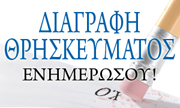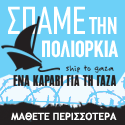ΕΙ-ΔΗΣΕIΣ ή αλλοιώς ΟΙ-ΔΥΣΕΙΣ
φρομ δι AMERICAN EMBASSY οφ GREECE
Case Study 2. Όχι και τόσο FREE PRESS
φρομ δι AMERICAN EMBASSY οφ GREECE
Case Study 2. Όχι και τόσο FREE PRESS
VZCZCXRO2306
PP RUEHAG RUEHAST RUEHDA RUEHDF RUEHFL RUEHIK RUEHKW RUEHLA RUEHLN
RUEHLZ RUEHPOD RUEHROV RUEHSR RUEHVK RUEHYG
DE RUEHTH #1116/01 2170549
ZNR UUUUU ZZH
P 040549Z AUG 08
FM AMEMBASSY ATHENS
TO RUEHC/SECSTATE WASHDC PRIORITY 2297
INFO RUEHIK/AMCONSUL THESSALONIKI PRIORITY 1923
RUEHZL/EUROPEAN POLITICAL COLLECTIVEUNCLAS SECTION 01 OF 02 ATHENS 001116 SIPDIS SENSITIVE BUT UNCLASSIFIED STATE FOR R CRIEHL; EUR CGRAFFEY, MBRYZA; EUR/PPD MOKEEFE, GCOUCH, BARMSTRONG; EUR/SE KFITZGERALD, BHUNT, GCOWAN, SALTMAN-WINANS; IIP/SEG RHOBYN COSTEN; FSI FOR BLEVIN E.O. 12958: N/A TAGS: SOCI KPAO OIIP GR¶1. (SBU) On July 25-26, Mosaiko.gr, Embassy Athens' youth-oriented website, sponsored a conference entitled "The Free Press Phenomenon" for publishers, editors, and journalists of the Greek free and alternati6e press at a beach-side hotel, featur)ng speaker3 frgm the Village Voice and AM New York. The right kind of event for a Greek summer, the cgnferefce allowed us to connect in a caqUal, fun way with this growing segment kf the media, including some papers that are exclusi6ely distributed on college campuses. Having two speakers who disagreed on key points coming from such high-profile U.S. outlets made for a lively discussion, and increased our credibility. You have to know your readers and write the kind of stories they want to read, but you also have to know your advertisers and pay close attention to their bottom line, the two American journalists stressed, especially if you want to survive in the Internet age. Given the great feedback we have gotten to date, SUBJECT: THE FREE PRESS PHENOMENON: THE VILLAGE VOICE AND AM NEW YORK SPEAK IN GREECE ATHENS 00001116 001.2 OF 002 ------------------- SUMMARY AND COMMENT ------------------- we plan to leverage this exposure to U.S. models for the next generation of Greek journalists further by distributing the conference proceedings electronically, including for use in university classrooms in the fall. ¶2. (SBU) In line with global trends, a growing number of newspapers are being published and distributed free of charge in Greece, even as the traditional print press declines. The local franchise of ------------------------------ GROWING FREE, AND GOING STRONG ------------------------------ METRO, launched here in 2000 as a general interest daily aimed at commuters, currently estimates a daily circulation of 135,000 copies, as compared to the highest circulation traditional newspaper, Ta Nea, which sells around 60,000 copies. There are also several weekly alterative style papers in Greece, for example the Athens Voice (based quite heavily on the Village Voice), some of which were founded in the run-up to the 2004 Olympic Games. Most such publications target a youth audience, and several are distributed exclusively on college campuses. Both types of free print media are doing well here, due in part to the fact that Greece has one of the lowest Internet penetration rates in Europe (about 30%), although they still do not enjoy the respect or staffing quality of traditional publications. ¶3. (SBU) Given the importance of this segment of the media and our own MSP focus on the audience they serve, we thought carefully about keynote speakers for our conference. We chose former Village Voice editor Don Forst, now a professor at SUNY Albany, because of the strong local brand recognition of this American classic and the fact that it won a Pulitzer under his leadership. We invited AM New York's current publisher, Terry Jimenez, because he represents the largest daily circulation newspaper in New York, and to add balance to our event. The IIP Speakers Bureau was able to convince both speakers to come and arrange all the logistics for their visit. We then invited 30 publishers, editors, and reporters representing the 15 top Greek weekly alternative and daily free press outlets to a beach-front hotel about an hour from Athens for the two-day event. The budget for the conference was about $25,000, of which $15,000 came from EUR/PPD's "unfunded priorities" allocation, and $10,000 from post's general operating expense account. -------------------------- KEEPING IT FREE...AND REAL -------------------------- ¶4. (U) The conference was divided into three sessions over the course of a Friday and Saturday, ATHENS 00001116 002.2 OF 002 each of which featured a presentation by the keynote speakers, discussion, then answers to questions submitted by participants in advance. The sessions were entitled: "The Free Press Phenomenon and Its Impact on Urban Culture;" "Keeping the Free Press Alive: Advertising and Budget Issues;" "The Free Press and the Internet." ¶5. (SBU) Greek participants were interested mainly in how to maintain their journalistic freedom and independence, given the total reliance on advertisers that goes along with the free press model. The speakers gave a great picture of how their papers do this: they not only know their audiences very well, but pay very close attention to the business side of their operations. Forst commented, "We [were] not afraid of anybody...not our readers...not our advertisers. That comes from being successful." Some participants noted that this is not as easy as it sounds in Greece, in part because the state controls such a large share of the advertising pie. An experienced Greek journalist who writes for both mainstream and alternative papers told us, off-line, that this share is perhaps 30-40%, and moreover, that Greek government allocations are often politically rather than economically motivated. ¶6. (SBU) On another issue of great interest, the impact of the Internet, the two speakers gave opposing views. Forst doubted that alternative print publications would survive the impact of this new technology, saying that the young Americans he teaches rarely read any newspaper of any kind. Jimenez, however, pointed out that tailoring a print product for New York City subway commuters has been a very successful business model. He added that his organization is exploring value-added on-line services along the lines of e-Bay and Craigslist, rather than being content just to post its current content. ----------------- LET'S DO IT AGAIN ----------------- ¶7. (U) Prior to the conference, we set up an interview with Don Forst in a top alternative Greek weekly, LiFO. The article was positive and included great pictures: http://www.lifo.gr/content/x8/783. We also hosted a pre-conference press roundtable that was well-attended by mainstream Greek media outlets, including several traditional daily newspapers and independent SKAI TV, which broadcast a feature about the event on its weekend ecology- themed, youth-oriented news program. ¶8. (U) At the end of the conference, participants were asked to fill in an on-line survey, with a link provided on a Mosaiko.gr branded flash disk, with their thoughts on both the conference and the website. Because of technical difficulties, including a poorly timed attack on the site, we have been unable to collect and process this data. But all of the invitees expressed interest in learning about other programs offered by the Embassy and in working together on news and feature stories going forward. The speakers also responded very positively to the experience, and registered their interest in participating in other State Department programs. ¶9. (U) We have posted a feature story about the conference on our main website, http://athens.usembassy.gov/mosaiko_conferenc e.html, and will soon be posting transcripts of the speakers' presentations on this website as well as Mosaiko.gr. We also plan to offer taped versions on DVD to local journalism professors in the fall. SPECKHARD






















